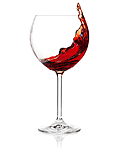 And again red wine enters the grand world of health breakthroughs! For those who like a glass or two of pinot noir, the news is…good! A new study has found that red wine could help women shield themselves from breast cancer.
And again red wine enters the grand world of health breakthroughs! For those who like a glass or two of pinot noir, the news is…good! A new study has found that red wine could help women shield themselves from breast cancer.
Since cancer prevention is always a vital topic for us all, such breakthroughs like this are welcome. This one suggests women can use red wine — in moderation only — as a weapon against one of the major causes of death amongst U.S. women. The new study challenges the widely held belief that alcohol consumption in general increases one’s risk of developing breast cancer. The notion has been that alcohol increases the body’s estrogen levels, fostering the growth of cancer cells.
Yet this latest study found that chemicals in the skins and seeds of red grapes slightly lowered estrogen levels while raising testosterone. This was found among women who drank eight ounces of red wine nightly for about a month. White wine did not have the same effect.
The results reaffirm the notion that red wine truly trumps white in the health department. Also proven in the past to be heart-healthy when consumed in moderation, red wine may truly be a healing food.
(How red wine might help your brain as well: Can a Little Drink Actually Help Your Brain?)
Breast cancer is the leading type of women’s cancer in the U.S. with 230,000 new diagnoses each year. This amounts to 30% of all female cancer diagnoses. In 2011, nearly 40,000 U.S. women died from breast cancer.
In the study, 36 women randomly drank either Cabernet Sauvignon or Chardonnay daily for almost a month. Then the two groups switched, with blood samples used to check hormone levels. The goal was to see if red wine mimics “aromatase inhibitors,” which play a key role in managing estrogen levels. Aromatase inhibitors are drugs used to treat breast cancer.
Investigators said that the change in hormone patterns suggested that red wine may cut the growth of cancer cells. It seems that white wine doesn’t offer the same protective benefits, likely due to the grapes used to make it.
The natural chemicals in red wine, led by resveratrol, continue to shine in the disease-prevention category.
